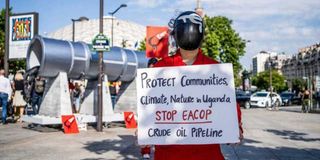Govt, NGO square off over oil pipeline

A man protests against the East Africa Crude Oil Pipeline (Eacop) in Paris, France, on September 23, 2022. Demonstrators were calling for the protection of communities and nature in Uganda. PHOTO | AFP
What you need to know:
The report reveals that land acquisition for the project has caused severe financial hardships for thousands of Ugandan farmers, including heavy household debt and food insecurity.
The French fossil-fuel giant TotalEnergies’ planned oil pipeline in East Africa has devastated thousands of people’s livelihoods in Uganda and will exacerbate the global climate crisis, a report has said.
The project, which is expected to displace more than 100,000 people, according to the latest research, has caused food insecurity and household debt, school dropouts, and is likely to have more devastating effects on the environment.
The 47-page report titled: “Our Trust is Broken: Loss of Land and Livelihoods for Oil Development in Uganda’’ was released by the US-based Human Rights Watch (HRW), a non-governmental organisation, yesterday.
“If completed, the East African Crude Oil Pipeline (EACOP) project will have dozens of well pads, hundreds of kilometres of roads, camps and other infrastructure, and a 1,443-kilometre pipeline connecting oilfields in western Uganda with the port of Tanga in eastern Tanzania,” the human rights body said.
The report also documents the challenges of land acquisition for one of the largest fossil-fuel infrastructure projects under construction in the world.
Although 90 percent of people who will lose land to the project have received compensation from TotalEnergies EP Uganda, the project has suffered from multiyear delays in paying compensation and inadequate compensation, the findings reveal.
“EACOP has been a disaster for the tens of thousands who have lost the land that provided food for their families and an income to send their children to school, and who received too little compensation from TotalEnergies,” Mr Felix Horne, the senior environment researcher at Human Rights Watch, said.
“EACOP is also a disaster for the planet and the project should not be completed,” he further warned.
Survey
The report is based primarily on more than 90 interviews that HRW conducted in early 2023, including 75 displaced families in five districts of Uganda.
HRW discovered that the impact of multiyear delays has been compounded by unclear communications as to whether farmers can continue to use the land to harvest coffee, bananas, and other cash crops in the interim.
Consequently, the land acquisition process has caused severe financial hardships for thousands of Ugandan farmers, including heavy household debt, food insecurity, and an inability to pay school fees, causing many children to drop out of school.
Farmers said they felt pressured to sign compensation agreements in English, a language many of them cannot read, and many described being offered cash instead of the option of replacement land in line with international standards.
Unkept promises about grave relocation and an improvement in the quality of life that was promised in the many early meetings extoling the virtues of EACOP have eroded trust between communities and TotalEnergies.
“They come here promising us everything,” a resident, who preferred anonymity in order to speak freely, said. “We believed them. Now we are landless, the compensation money is gone, what fields we have left are flooded, and dust fills the air.”
TotalEnergies is the principal company involved through its Ugandan subsidiary TotalEnergies EP Uganda, alongside the China National Offshore Oil Company and the state-owned oil companies of Uganda and Tanzania. Atacama Consulting and Newplan Group managed the land acquisition process on behalf of TotalEnergies EP Uganda.
TotalEnergies has promised to respect various international standards, including International Finance Corporation (IFC) Performance Standards, which require TotalEnergies and its subsidiaries to restore or enhance livelihoods to pre-disturbance levels.
The pipeline has secured about 60 percent of its funding target. While the project still searches for the necessary financing, TotalEnergies and its subsidiaries should increase the amount of compensation and livelihood restoration efforts to be consistent with human rights standards.
TotalEnergies’ response
In a June 15 letter to Human Rights Watch, TotalEnergies stated that they “continue to pay close attention to respecting the rights of the communities concerned” and provided detailed responses underscoring their view that the compensation offered was in accordance with IFC standards.
Atacama Consulting, the environmental consulting firm facilitating land acquisition for TotalEnergies EP Uganda in the Tilenga oilfields, responded on June 22.
The consulting firm dismissed allegations that pressure was applied to people to sign compensation agreements and outlined why in their view, the compensation met the requirement of “full replacement cost.”
GOVT REFUTES HRW CLAIMS
Mr Christopher Ocowun, a public relations officer at TotalEnergies, referred this newspaper to Uganda National Oil Company (UNOC).
UNOC is a Uganda company governed by the Upstream Act 2013 and established under Company Law in 2015, to represent government commercial interests in the oil and gas sector along the entire petroleum value chain.
Mr Philips Obita, the acting chief executive officer of UNOC, in a letter addressed to Human Rights Watch dated June 23, said: “As a government company, UNOC adheres to the Constitution of the Republic of Uganda, which is the overall law of the land and specifically Chapter 4 which provides for human rights and freedoms of all persons.”
In accordance with the Production Sharing Agreements, UNOC is a 15 percent Joint Venture partner in the upstream licenses, namely the Tilenga and Kingfisher projects.
Also, in accordance with the relevant Shareholders Agreement is also a 15 percent shareholder in the East African Crude Oil Pipeline Company- the special purpose company created to construct and operate the 1,443km East African Crude Oil Pipeline that runs from Kabaale (Hoima) in Uganda to the Indian Ocean port of Tanga in the Republic of Tanzania together with the regulator - Petroleum Authority of Uganda.
“It is with this background that UNOC is of the firm view that the land acquisition process carried out by the Upstream Operators (TotalEnergies and CNOOC) and by EACOP Company in Uganda and Tanzania is both in conformity with Ugandan/Tanzanian Law and the International Finance Corporation Performance Standards,” Mr Obita said.
UNOC said that the 75 people (or 83 households) interviewed for the HRW research project fall under the specifications of project-affected persons as per the Law and the IFC Performance Standards.
While the report suggests that more than 100,000 people will be displaced, UNOC said that 3,792 is the total number of project-affected persons (PAPs) in Uganda.
At least 2,740 acres of land are required for the EACOP corridor in Uganda, 10,081 acres of land is required in Tanzania for the pipeline corridor; while 9,898 is the total number of project-affected persons in the Republic of Tanzania.
According to UNOC, 87 percent of all PAPs have signed their compensation agreements in Uganda. Of these, 203 of them are primary residents in the EACOP corridor and will be physically displaced by the project. The rest are economically displaced meaning they cultivate the land in the corridor but do not live there.
Out of 203 primary residents, 177 have chosen in-kind compensation, that is a replacement house (146 houses have been handed over to date). The rest are under construction, the company said, adding: “The project encourages in-kind compensation as is required by the IFC standards.”
Mr Obita also said UNOC has taken several steps to ensure that Total Energies and its subsidiaries respect the highest environmental and social standards in the implementation of the EACOP project, and the land acquisition process in particular.
He said UNOC participated in both the EACOP Resettlement Planning Phase and implementation. This has been done through involvement during stakeholder engagements with different stakeholders and Project Affected Persons.
“UNOC has also participated and witnessed the disclosure of entitlements, Financial Literacy Training, Bank accounts opening, and compensation agreement signing along the entire EACOP route, and the process has been transparent, comprehensive, and compliant with the law, IFC standards and approved RAP framework and applicable internal policies,” he added.
To address the concern of the devastation of people’s livelihoods in Uganda, UNOC said there are measures they plan to take to ensure Total Energies and its subsidiaries are restoring or enhancing livelihood from pre-disturbance levels. These include livestock, food, training on new techniques, and assistance with school fees.
UNOC also said steps have been taken to ensure Total Energies and its subsidiaries make sure affected people are able to understand and freely consent to compensation agreements.
“UNOC has and continues to participate and witness the process of compensation agreements signing where the agreements are interpreted by the field team into the languages that are clearly understood by PAPs,” the acting chief executive officer said.
“PAPs who are not ready to sign instantly are given 14 days for reflection, consultation with third parties and they have the right to seek legal advice if they are not contended.”




